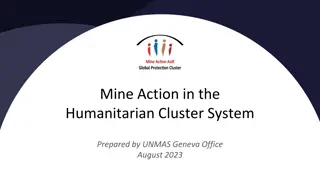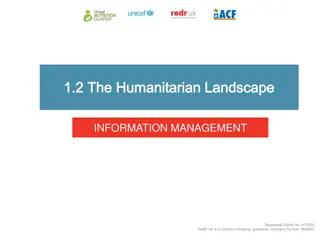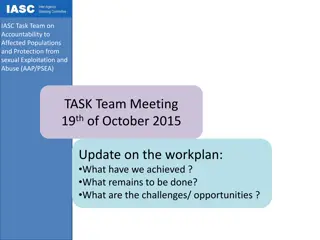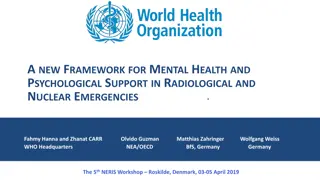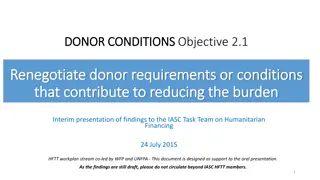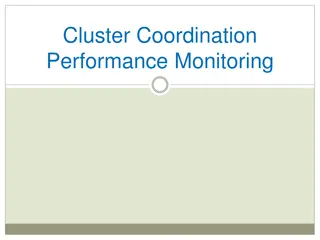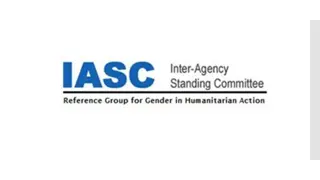Mine Action in the Humanitarian Cluster System
The Inter-Agency Standing Committee (IASC) plays a crucial role in coordinating humanitarian efforts, with a focus on mine action in the global protection cluster. This involves clear responsibilities, strategic planning, and advocacy to address humanitarian needs. The IASC Reference Module for Clus
4 views • 18 slides
Understanding Humanitarian Landscape and Coordination Challenges
The humanitarian landscape involves various organizations working together to provide assistance during crises. Coordination challenges, such as identifying needs, existing assistance, and government involvement, have been prevalent. The Inter-Agency Standing Committee (IASC) was established in 1991
2 views • 21 slides
Accountability and Protection Task Team Progress Update
The IASC Task Team on Accountability to Affected Populations and Protection from Sexual Exploitation and Abuse (AAP/PSEA) provided an update on their workplan achievements, remaining tasks, challenges, and opportunities. Progress includes establishing a common language for AAP and PSEA, advocating f
0 views • 14 slides
Mental Health and Psychological Support in Emergencies Framework
A framework for mental health and psychological support in radiological and nuclear emergencies was discussed at workshops in Jakarta and Roskilde. Global action has been ongoing since 1992 through the IASC, focusing on addressing mental health needs during emergencies and crisis situations. Termino
0 views • 18 slides
Renegotiation of Donor Conditions for Humanitarian Financing
This interim presentation outlines the objective of renegotiating donor requirements to reduce burden in humanitarian financing. Findings focus on the severity of conditions, methodology used, respondents involved, general findings, and top conditions affecting humanitarian principles. The document
1 views • 12 slides
Understanding Cluster Coordination Performance Monitoring (CCPM)
The Cluster Coordination Performance Monitoring (CCPM) is a self-assessment tool that helps evaluate cluster performance against core functions and Accountability to Affected Populations. It aims to improve coordination and accountability within clusters, developed by the IASC Sub-Working Group. Mon
0 views • 16 slides
Enhancing Gender Equality in Humanitarian Action
The Gender Reference Group (GRG) conducted a review in 2015 of the IASC's Gender Policy Statement, highlighting inconsistent implementation and lack of gender capacity. As the GRG Chair, UN Women will lead the revision of the 2008 Gender Policy to establish an accountability framework. This update a
0 views • 5 slides
